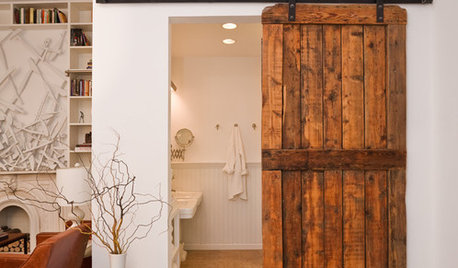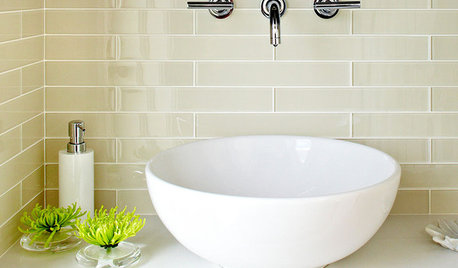questions about drills and drivers
tetrazzini
15 years ago
Related Stories

ARCHITECTURE10 Things to Know About Prefab Homes
Are prefab homes less costly, faster to build and greener than homes constructed onsite? Here are answers to those questions and more
Full Story
REMODELING GUIDESSurvive Your Home Remodel: 11 Must-Ask Questions
Plan ahead to keep minor hassles from turning into major headaches during an extensive renovation
Full Story
GREEN DECORATING8 Questions to Help You See Through Green Hype
With the ecofriendly bandwagon picking up some dubious passengers, here's how to tell truly green products and services from the imposters
Full Story
FEEL-GOOD HOMEThe Question That Can Make You Love Your Home More
Change your relationship with your house for the better by focusing on the answer to something designers often ask
Full Story
DOORS5 Questions to Ask Before Installing a Barn Door
Find out whether that barn door you love is the right solution for your space
Full Story
FUN HOUZZEverything I Need to Know About Decorating I Learned from Downton Abbey
Mind your manors with these 10 decorating tips from the PBS series, returning on January 5
Full Story
CONTRACTOR TIPSBuilding Permits: What to Know About Green Building and Energy Codes
In Part 4 of our series examining the residential permit process, we review typical green building and energy code requirements
Full Story
ARCHITECTURE4 Things a Hurricane Teaches You About Good Design
When the power goes out, a home's design can be as important as packaged food and a hand-crank radio. See how from a firsthand account
Full Story
MOST POPULARWhat to Know About Adding a Deck
Want to increase your living space outside? Learn the requirements, costs and other considerations for building a deck
Full Story
REMODELING GUIDESFinishing Touches: Pro Tricks for Installing Fixtures in Your Tile
Cracked tile, broken drill bits and sloppy-looking fixture installations? Not when you follow these pro tips
Full Story








bobismyuncle
aidan_m
Related Professionals
Ham Lake Cabinets & Cabinetry · New Castle Cabinets & Cabinetry · Ridgewood Carpenters · Ballwin Flooring Contractors · Deerfield Beach Flooring Contractors · Desert Hot Springs Flooring Contractors · Dorchester Flooring Contractors · Emmaus Flooring Contractors · Fort Myers Flooring Contractors · Green Bay Flooring Contractors · Riverhead Flooring Contractors · South Lake Tahoe Flooring Contractors · Strongsville Flooring Contractors · Newnan Furniture & Accessories · Tucson Furniture & Accessoriesbobismyuncle
aidan_m
tetrazziniOriginal Author
sombreuil_mongrel
bobismyuncle
tetrazziniOriginal Author
Jon1270
Jon1270
tetrazziniOriginal Author
brickeyee
Jon1270
brickeyee
mmack66
tetrazziniOriginal Author